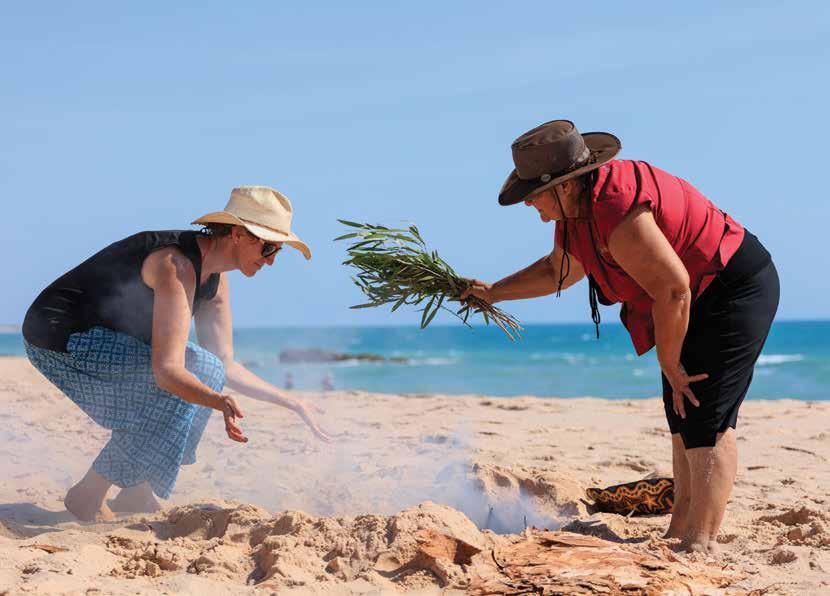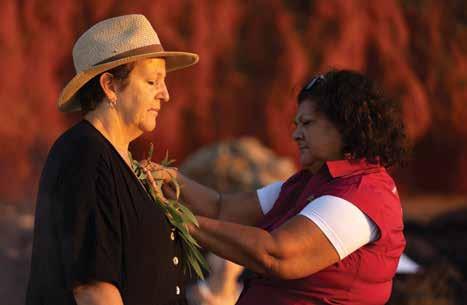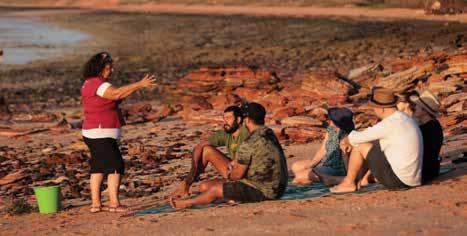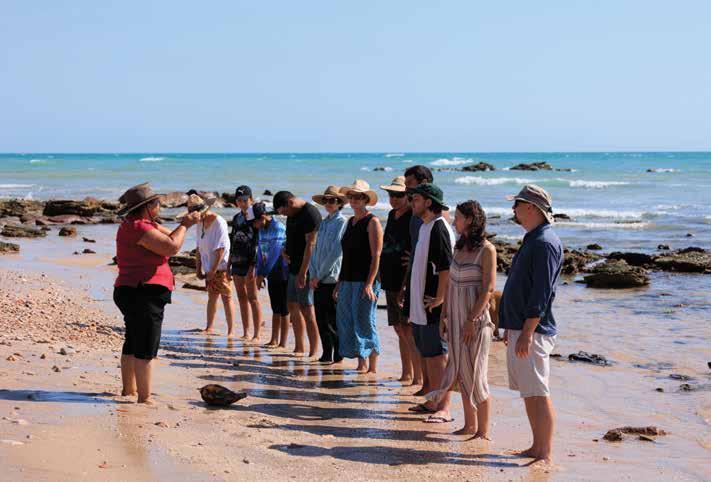
5 minute read
education on country An
Delve into another way of life and gain a new perspective with one of Pat Torres’ cultural immersion tours.
By TORI WILSON
Pat Torres is quite the force to be reckoned with. An artist, writer, cook, community worker, educator, a cultural tour facilitator and producer of bushfoods products, Pat recognises that as an Aboriginal businessperson, it’s important to diversify to thrive.
Belonging to seven traditional language groups — including the Jabirr Jabirr group from the north of Broome, the Nyul Nyul group from Beagle Bay area and the Djugun and Yawuru people from Broome — Pat is a wealth of knowledge when it comes to cultural customs and traditional ways of life.
Combined with her formal education, a Bachelor of Arts, a Diploma of Education and a Bachelor in Indigenous Languages and Linguistics, Pat says she’s driven by a desire to change the narrative of Aboriginal people within predominately non-Aboriginal societies and showcase the depth of what Aboriginal tradition can offer.
When asked about the passion behind her native bushfoods business Mayi Harvests, Pat says “the intention was to share our knowledge of our stories. As I’m an educator I wanted to share the information about our culture, our languages and our foods to create a better understanding between ourselves as First Nations people and all other Australians.
“One of the gaps I understand and experience is there is a lack of positive information about us. My role as an educator is to bring in change relating to understanding and appreciation for us as First Nations people through our culture. Unless you learn about Aboriginal culture, you’re only getting a surface understanding of Australia.”
Mayi — a word from the Djugun / Yawuru language group of West Kimberley — means plant foods derived from parts of plants including seeds, fruits, nuts, breads and cakes.
With the Kakadu plum (aka gabiny – a
Djugun word) at its core, Mayi Harvests follows the traditional methods of wild harvesting through the Kimberley’s six seasons to ensure a sustainable future for native fruit, which it supplies across Australia. Not only does Mayi Harvests perpetuate the use of traditional land care knowledge, it supports work among local Aboriginal people by offering them the opportunity to harvest their land seasonally and maintain cultural traditions. More recently, Pat through the Northern Australian Aboriginal Kakadu Plum Alliance has produced a Kakadu plum powder as an option alongside the fresh fruit.
Given the seasonality of the product, “sustainable harvesting means utilising Traditional Ecological Knowledge systems and best practice to work with the environment. As it’s not consistently available year-round the fruit is gathered and frozen to be available throughout the year,” says Pat.
“We’re working with the effects of climate change and what sustainability means to us as Traditional Owners, so we don’t want to damage the forest. Even though I’ve been encouraged to do much more volume by my customers’.
“I’m driven by working with the sustainability of the forests and the health of our earth and lands,” says Pat.
Because of this disconnect between responsible and traditional foraging methods and the functionality and high demands of modern-day markets, it can be almost impossible to create a sustainable business based on just a few products alone.
“We’ve had to diversify our income streams and products to survive,” says Pat, who’s now offering three regular cultural tours in addition to her Mayi Harvests food products.
Cultural Immersion
Of Pat’s tours, one that stands out is her Jarndu Ngaank Tour (Jarndu ngaank meaning woman’s word), is the ‘Women Only’ tour
“I’m coming in with a woman’s perspective, because most of the tour operators operating out of Broome are all men, so that’s my point of difference,” says Pat. “I’m giving the woman's side of the story.”
“The women’s tour basically takes women for a two-hour trip to the women’s site in Broome. I tell them about all the stories that connect them to that site, which includes ancient stories, information about our family’s cultural connection to that area, a dance I was taught and a song of protection, the blessing smoke and introduction to Djugun and Yawuru language words for that site”.
“It’s helpful for women who may need a break and may be suffering from stress as well. It gives them strategies on how to meditate the Aboriginal way to get rid of negative energies,” says Pat. “And because I’ve been a foodie, I also brought in tastings of food and drinks which I’ve made from our local botanicals.”
Speaking of foodies, Pat says she can also offer one-on-one cultural immersion tours and recently took a chef from Canberra out on country for three weeks. The experience will inform the chef's proposed book about different Australian women involved in a diversity of occupations.
As part of the experience, Pat sought permission to bring her guest to an Aboriginal women’s camp, a life opportunity which took place across five days, before taking her onto Pat’s country to practice traditional living for another two weeks.


“There were lots of different fruits in season, so we collected the fruits and made bush cordials from honey, flowers and fruits. Then we went onto the reef and collected seafood and came back and cooked it up with herbs and spices in paperbark wrappings.”
Going out on country and practising traditional Aboriginal living is something that would be beneficial for all Australians to experience. Pat welcomes anyone to do just that through another of her tours, taking place north of Broome.

For four hours, groups get to shake off the pressures of western culture, adopt a new kinship name and be immersed in a role that experiences what it means living within a tradition-informed Aboriginal society.
“We have a four-kinship system, so I teach them their name and their roles and they go out and collect wood, catch fish, make a fire, so it’s all experiential about what your role is as an individual within a society based on our kinship groups,” says Pat.
Unlike Pat’s other tours, she doesn’t offer pre-made bushfoods, but encourages participants to source their own food under her direction. Going beyond survival, she also teaches the members of the society a dance, specific to their gender and assigned ‘skin group’ for the day’s activities.
“It’s a great team building exercise but also gives them hands on activities so they can immerse themselves in a northern culture,” says Pat.
As a shorter, more accessible tour, Pat runs cultural sessions twice a week at Broome’s foreshore beach, welcoming people to the area with a smoking ceremony and welcome to country, sharing stories of Broome and its origins, as well as cultural insights.

Pat’s tours are special experiences. Unlike the modern education system, they’re a chance to delve into an alternative way of learning as Aboriginal societies traditionally operate, outdoors and through action rather than within a classroom.
“(It’s about) learning about a place and experiencing the deep cultural knowledge that can be found in Australia so you can experience our depth of knowledge and culture,” she says.
“Through participating in our cultural immersive tours, participants are helping to grow our businesses, helping us to go forward with our dreams of a better world for all and provides a more humanistic view of the world through sharing the depth of our knowledge.”
Visit mayiharvests.com.au










